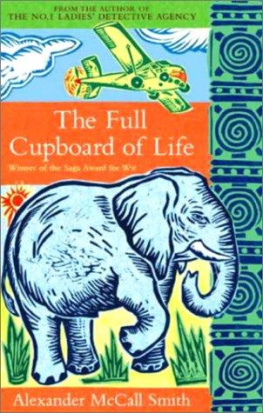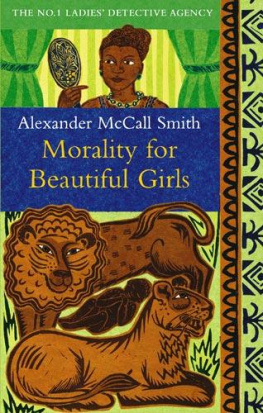This book is fo r Anne Gordon-Gillie s in Scotlan d
and fo r Joe and Mimi McKnigh t in Dallas, Texa s
CHAPTER TWELVE
MMA RAMOTSWES HOUSE I N ZEBRA DRIV E
T HE HOUSE had been built in 1968, when the town inched out from the shops and the Government Buildings. It was on a corner site, which was not always a good thing, as people would sometimes stand on that corner, under the thorn trees that grew there, and spit into her garden, or throw their rub bish over her fence. At rst, when she saw them doing that, she would shout from the window, or bang a dustbin lid at them, but they seemed to have no shame, these people, and they just laughed. So she gave up, and the young man who did her garden for her every third day would just pick up the rub bish and put it away. That was the only problem with that house. For the rest, Mma Ramotswe was ercely proud of it, and daily reected on her good fortune in being able to buy it when she did, just before house prices went so high that hon est people could no longer pay them.
The yard was a large one, almost two-thirds of an acre, and it was well endowed with trees and shrubs. The trees were nothing specialthorn trees for the most partbut they gave good shade, and they never died if the rains were bad. Then there were the purple bougainvillaeas which had been enthusiastically planted by the previous owners, and which had almost taken over by the time Mma Ramotswe came. She had to cut these back, to give space for her pawpaws and her pumpkins.
At the front of the house there was a verandah, which was her favourite place, and which was where she liked to sit in the mornings, when the sun rose, or in the evenings, before the mosquitoes came out. She had extended it by placing an awning of shade netting supported by rough-hewn poles. This ltered out many of the rays of the sun and allowed plants to grow in the green light it created. There she had elephant-ear and ferns, which she watered daily, and which made a lush patch of green against the brown earth.
Behind the verandah was the living room, the largest room in the house, with its big window that gave out onto what had once been a lawn. There was a replace here, too large for the room, but a matter of pride for Mma Ramotswe. On the man telpiece she had placed her special china, her Queen Eliza beth II teacup and her commemoration plate with the picture of Sir Seretse Khama, President, Kgosi of the Bangwato people, Statesman. He smiled at her from the plate, and it was as if he gave a blessing, as if he knew. As did the Queen, for she loved Botswana too, and understood.
But in pride of place was the photograph of her Daddy, taken just before his sixtieth birthday. He was wearing the suit which he had bought in Bulawayo on his visit to his cousin there, and he was smiling, although she knew that by then he was in pain. Mma Ramotswe was a realist, who inhabited the present, but one nostalgic thought she allowed herself, one indulgence, was to imagine her Daddy walking through the door and greeting her again, and smiling at her, and saying: My Precious! You have done well! I am proud of you! And she imagined driving him round Gaborone in her tiny white van and showing him the progress that had been made, and she smiled at the pride he would have felt. But she could not allow herself to think like this too often, for it ended in tears, for all that was passed, and for all the love that she had within her.
The kitchen was cheerful. The cement oor, sealed and pol ished with red oor paint, was kept shining by Mma Ramotswes maid, Rose, who had been with her for ve years. Rose had four children, by different fathers, who lived with her mother at Tlokweng. She worked for Mma Ramotswe, and did knitting for a knitting cooperative, and brought her children up with the little money that there was. The oldest boy was a carpen ter now, and was giving his mother money, which helped, but the little ones were always needing shoes and new trousers, and one of them could not breathe well and needed an inhaler. But Rose still sang, and this was how Mma Ramotswe knew she had arrived in the morning, as the snatches of song came drifting in from the kitchen.
ALEXANDER McCALL SMITH
THE NO. 1 LADIES DETECTIVE AGENCY
First Anchor Books Edition, August 2002
Copyright 1998 by Alexander McCall Smith
All rights reserved under International and Pan-America n Copyright Conventions. Published in the United States b y Anchor Books, a division of Random House, Inc., New York , and simultaneously in Canada by Random House of Canad a Limited, Toronto. Originally published in softcove r in Scotland by Polygon, Edinburgh, in 1998 .
Anchor Books and colophon are registered trademark s of Random House, Inc .
Library of Congress Cataloging-in-Publication Dat a McCall Smith, R. A . The No. 1 Ladies Detective Agency / Alexander McCall Smith . p. cm .
eISBN 1-4000-7765-6
Women private investigatorsBotswanaFiction. 2. BotswanaFiction . I. Title: Number One Ladies Detective Agency. II. Title . PR6063.C326 N6 200 821'.914dc2 200201869
www.anchorbooks.com
CHAPTER ONE
THE DADD Y
M MA RAMOTSWE had a detective agency in Africa, at the foot of Kgale Hill. These were its assets: a tiny white van, two desks, two chairs, a telephone, and an old typewriter. Then there was a teapot, in which Mma Ramotswethe only lady private detective in Botswanabrewed redbush tea. And three mugsone for herself, one for her secretary, and one for the client. What else does a detective agency really need? Detective agencies rely on human intuition and intelligence, both of which Mma Ramotswe had in abundance. No inven tory would ever include those, of course.
But there was also the view, which again could appear on no inventory. How could any such list describe what one saw when one looked out from Mma Ramotswes door? To the front, an acacia tree, the thorn tree which dots the wide edges of the Kalahari; the great white thorns, a warning; the olive-grey leaves, by contrast, so delicate. In its branches, in the late afternoon, or in the cool of the early morning, one might see a Go-Away Bird, or hear it, rather. And beyond the acacia, over the dusty road, the roofs of the town under a cover of trees and scrub bush; on the horizon, in a blue shimmer of heat, the hills, like improbable, overgrown termite mounds.
Everybody called her Mma Ramotswe, although if people had wanted to be formal, they would have addressed her as Mme Mma Ramotswe. This is the right thing for a person of stature, but which she had never used of herself. So it was always Mma Ramotswe, rather than Precious Ramotswe, a name which very few people employed.
She was a good detective, and a good woman. A good woman in a good country, one might say. She loved her coun try, Botswana, which is a place of peace, and she loved Africa, for all its trials. I am not ashamed to be called an African patriot, said Mma Ramotswe. I love all the people whom God made, but I especially know how to love the people who live in this place. They are my people, my brothers and sisters. It is my duty to help them to solve the mysteries in their lives. That is what I am called to do.
In idle moments, when there were no pressing matters to be dealt with, and when everybody seemed to be sleepy from the heat, she would sit under her acacia tree. It was a dusty place to sit, and the chickens would occasionally come and peck about her feet, but it was a place which seemed to encourage thought. It was here that Mma Ramotswe would contemplate some of the issues which, in everyday life, may so easily be pushed to one side.










